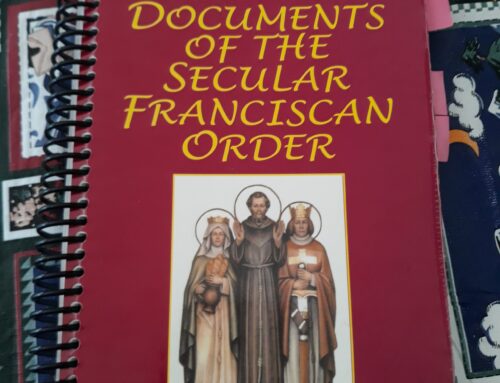 Our Brother Bill Short, who blessed us at the Q, (2012) has a wonderful set of tapes entitled “The Treasure of a Poor Man: St. Francis of Assisi and Franciscan Spirituality” https://www.learn25.com/product/the-spirituality-of-st-francis-of-assisi/. [nowyouknowmedia changed to learn25.com] In this set, Brother Bill gives 12 enlightening talks about various aspects of Franciscan Spirituality. In the 9th talk, entitled “No Gloomy Hypocrites! Spiritual Joy to Frustrate the Devil,” Brother Bill relates how St. Francis in the Rule of 1221 as much as mandates the spiritual practice of showing joy to all without exception.
Our Brother Bill Short, who blessed us at the Q, (2012) has a wonderful set of tapes entitled “The Treasure of a Poor Man: St. Francis of Assisi and Franciscan Spirituality” https://www.learn25.com/product/the-spirituality-of-st-francis-of-assisi/. [nowyouknowmedia changed to learn25.com] In this set, Brother Bill gives 12 enlightening talks about various aspects of Franciscan Spirituality. In the 9th talk, entitled “No Gloomy Hypocrites! Spiritual Joy to Frustrate the Devil,” Brother Bill relates how St. Francis in the Rule of 1221 as much as mandates the spiritual practice of showing joy to all without exception.
In the Omnibus of Sources, page 38, the Rule of 1221, Chapter 7, reads:
“And all the friars, no matter where they are or in whatever situation they find themselves, should like spiritually minded men, diligently show reverence and honor to one another without murmuring (1 Peter 4:9). They should let it be seen that they are happy in God, cheerful and courteous, as is expected of them, and be careful not to appear gloomy or depressed like hypocrites.”
“This may be the only Rule in the Catholic Church that has a positive command about being cheerful,” exclaims Brother Bill! He then makes several points about what I call this command to smile.
First, paraphrasing Brother Bill, it is not true that this command arises merely to generate the simple-minded, jovial, heavy-set friars like one may see in the comics, the movies, or on cookie jars. No. Brother Bill says that the Rule of 1221 may have come out of a time of considerable sadness and even doubt for St. Francis. The Order he had founded may have seemed to be growing away from him; he didn’t feel at times that he had a place in the Order. St. Francis may have even been tempted to leave the Order, Brother Bill suggests. Thus, this command arises out of a genuine struggle against a darkness of spirit.
Second, again paraphrasing, this command focused not merely on the individual, but on the effect the individual produced on the people the individual encountered. In other words, this command to be “happy in God, cheerful and courteous,” pointed as much outwardly as inwardly. Indeed, just one line before the command above, the Rule of 1221, Chapter 7, reads, “Everyone who comes to them, friend or foe, rogue or robber, must be made welcome” (Ibid.)
I pause to ask myself, “Do I always greet everyone, without exception, with cheer and joy? I must answer that I do not, yet St. Francis exhorts his followers that welcome and gladness must be on our faces, even before a “foe, rogue or robber.”
More than this, these Franciscans were living in fraternity, and they must not show their inner doubts and depression to those with whom they lived and worked and prayed lest the others lose their own spiritual joy. Brother Bill relates how the others around him constantly described St. Francis as “cheerful,” but when St. Francis felt that inner darkness, he would withdraw into prayer so as not to bring those he so loved down.
Again, I pause to ask myself, “Am I a cause of joy or do I bring sadness and doubt into the family circle, into the fraternity gathering?” And what about you?
Third, the deeper spiritual importance of this command to show joy was to combat the devil. Thomas of Celano writes in Chapter 88 of the Second Life in the Omnibus of Sources page 465:
“St. Francis maintained that the safest remedy against the thousand snares and wiles of the enemy is spiritual joy. For he would say, ‘The devil rejoices most when he can snatch away spiritual joy from a servant of God. He carries dust so he can throw it into even the tiniest chinks of conscience and soil the candor of mind and purity of life. But, when spiritual joy fills the heart,’ he said, ‘the serpent throws off his deadly poison in vain. The devils cannot harm the servant of Christ when they see he is filled with holy joy. When, however, the soul is wretched, desolate, and filled with sorrow, it is easily overwhelmed by its sorrow or it may turn to vain enjoyments.’
“The saint, therefore, made it a point to keep himself in joy of heart and to preserve the unction of the Spirit and the oil of gladness. He avoided with the greatest care the miserable illness of dejection, so that if he felt it creeping over his mind even a little, he would have recourse very quickly to prayer. For he would say, ‘If the servant of God, as may happen, is disturbed in any way, he should rise immediately to pray and he should remain in the presence of the heavenly Father until he restores unto him the joy of salvation. For if he remains stupefied in sadness, the Babylonian stuff will increase, so that, unless it be at length driven out by tears, it will generate an abiding rust in the heart.’”
Again, to paraphrase Brother Bill, other spiritual traditions in the Catholic Church may stress seriousness and gravitas, but the Franciscan spiritual tradition takes joy very seriously. The devil’s “dust” and “an abiding rust in the heart” must be avoided both in ourselves and in our influence on others.
Yes, my beloved sisters and brothers, there is much in the world around us to cause great dismay. We see hatred and war, violence and abuse, poverty and starvation. Yes, there may be much in our families and fraternities to cause us to worry and doubt. We see faction and discord as we pray to be instruments of God’s great peace. And yes, speaking for myself, I am a fallen creature, always beset by the devil, the world and the flesh. Sometimes I fall down. Sometimes I don’t do what I should do to help others. Sometimes I may cause others to fall.
Nonetheless, as children of the same all-loving, all-forgiving, all-powerful God, as permanently professed followers of Sts. Francis and Clare in the footsteps of our Lord and Savior Jesus Christ, let us heed seriously this aspect of spiritual joy so firmly grounded in the Franciscan spiritual tradition.
Let us strive to be cheerful and welcoming to all we meet, to combat that darkness in ourselves and in others.
Let us never cease praying and working for our families and fraternities to be places where true spiritual joy in the Lord resides and where we are recognized by all as people “happy in God, cheerful and courteous.”
And may the Peace of Christ and the Spiritual Joy of Sts. Francis and Clare abide always with us, we pray in the name of the Father, and the Son and the Holy Spirit.
Reflection Questions
- Perhaps unlike other major Catholic spiritual traditions, what did St. Francis himself virtually mandate for all his followers?
- According to Brother Bill Short, OFM, why might this mandate be unique?
- Again, according to Brother Bill, how might this mandate have arisen out of a real struggle against spiritual darkness?
- Specifically regarding this mandate, what might be our obligations to our sisters and brothers in our Secular Franciscan fraternities?
- Specifically regarding this mandate, what might be our personal obligations to ourselves? Why?
- According to St. Francis, what is the single best remedy against the onslaughts of the devil?
- What specifically might we do to bring more love, peace and joy to ourselves and our Secular Franciscan fraternities?
This is an excerpt from a series of articles by the late Deacon Tom Bello, OFS, former Minister of the National Secular Franciscan Order – USA. “Many of these essays were originally published in TAU-USA, our national newsletter,” said Jan Parker, OFS, current National Minister. “They are excellent for reflection and ongoing formation.” Jan helped Tom publish these essays in book form. It is called For All The Saints: St. Francis’s Five-Point Plan for Salvation and is available from Tau Publishing. These excerpts will appear several times a week on the Secular Franciscans website.



Leave A Comment